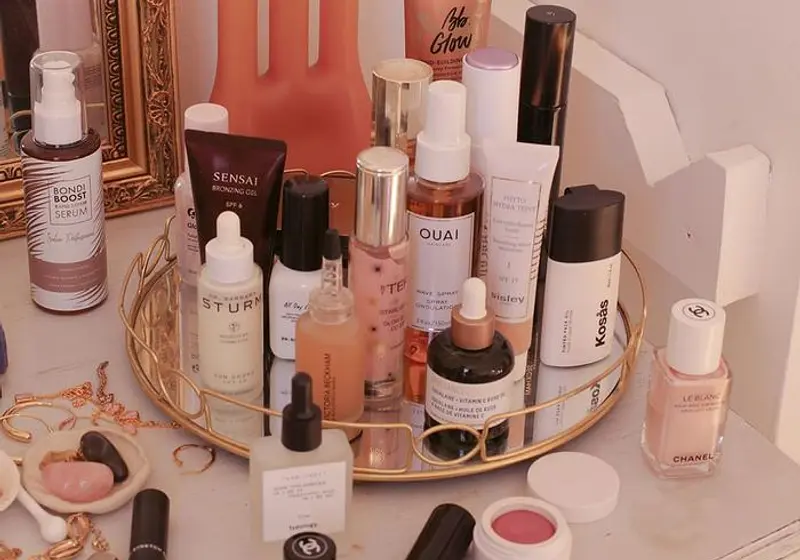It all started with Tik Tok. Before Tik Tok, I had no issues with my facial features. Of course, I always had body insecurities, but that came naturally as a developing teenager.
One of the first things I saw after downloading Tik Tok in my freshman year of high school was girls pointing out their personal flaws and insecurities. I would open the app and see at least 2-3 videos a day of girls complaining about how gross their nose is, or how their hips aren’t perfectly round, or how their stomachs have small pouches that poke out in leggings. I didn’t even know these beauty standards existed until I was introduced to them. It's as if people began to point out niche imperfections out of thin air.
So, where are all these insecurities coming from, and why are girls like me falling for them?
Let us slide into your dms 🥰
Get notified of top trending articles like this one every week! (we won't spam you)The Ideal Image?
They come from social media. They come from celebrities and influencers promoting bodies that have obviously been altered or are fake and then promoting those bodies as the natural beauty standard. Insecurities don’t exist until someone points them out.
Women have always been insecure about their looks, but altering them with plastic surgery has not always been possible. By fixing parts of their bodies, influencers are communicating to teenage girls that they also need to “fix” what is more real about themselves, in order to be perceived as beautiful.

Take the Quiz: Discover Your Ideal Stress-Relieving Hobby
Everyone deals with stress differently, and finding the right hobby can help you relax and unwind. Take this quiz to find out which stress-relievin...
Pop-Culture Perfection: Should Girls Trust It?
Take Khloe Kardashian. If you don't know already, Khloe Kardashian is a famous reality TV star, with over 146 million instagram followers. Like all of her famous sisters, she, too, had plastic surgery.
Khloe, however, changes her appearance almost every week. If you compare her instagram photos over the past few months, she looks like a whole new person in each one. Khloe is constantly ridiculed by the media for being the “ugly” sister, and therefore continues to keep changing her body. She sees unrealistic beauty standards and continues to strive for “perfection.” But what is perfection, and how is it actually achieved?
While I don’t have my own definition of perfection yet, I do know that the internet’s idea of “perfection” changes every week. One day you have to be skinny, and the next day you should gain weight. Beauty standards are constantly evolving and changing, and poor Khloe is attempting to keep up with them, instead of seeing how truly beautiful she is.
Every day, more and more girls are falling into this trap. They begin to want to change their appearance, which will eventually lead them to the never ending quest for perfection that Khloe Kardashian has taken. To be fair, I also fell for it.
I began to hate my nose and chin. I began to want to physically alter my face through surgery, thinking it would make me feel better about myself. But as time went on, I realized there was nothing “wrong” with me.
The people around me, including those whose opinions I truly valued, would tell me I was beautiful. Once I stopped spending long amounts of time on social media, I began to listen to those around me. I found my beauty by listening to the opinions of those who I know are real--and not those who are constantly alerted by their appearances. Real people hold themselves to their own standards, and they do things for themselves.
A New Perspective?
Teen culture--from speech to clothing choices--is completely influenced by social media. I know because my slang and my clothes mimic what I see online. While this creates community, it also creates many young people who only ever do what other people are doing.
So I couldn’t help thinking about the millions of young girls who are also affected by these fake beauty standards, and haven’t been able to understand how beautiful they are. Everyday, I see more and more posts of young teenagers complaining about their features, longing to get them altered- just like the stars they look up to on social media.
Let’s face the facts: Khloe Kardashian is NOT a real person. Yes, she is living and breathing, but her body and face have all been surgically altered. This includes her eyes, lips, hips, breasts and more.
However, she denies getting any plastic surgery done whatsoever, other than her face. But whether she has the surgery or not, the content of herself that she puts out in the media is obviously physically and/or digitally altered. Because Khloe is not open about her surgeries, it leads young teenage girls to believe that her appearance is supposedly natural and real.
Why Khloe?
Khloe receives so much fame and admiration from society, young girls begin to idolize her. They believe that mimicking the same features Khloe has will make them attractive and admired.They soon begin to point out insecurities that have never even been brought up to them, because they notice a certain feature of them isn’t “perfect,” like Khloe’s. But people set their own standards of ”perfection”.
Even if Khloe sees herself as “perfect” now, she is not perfect to everyone else. Perfection is different for everyone. Not everyone will find Khloe extremely attractive and admirable, and that goes the same for everyone.
But Khloe’s problem is that she can not handle this truth: no matter what she does, not everyone will think she is beautiful. You see, she is not doing what she thinks is beautiful, but rather, what she thinks society sees as beautiful. Young girls must not fall into the cycle of judging themselves by other peoples’ idea of perfection.
To the young girls reading this article, I say this: Perfection outside of you does not exist- you are perfection. Many of the bodies we see online are not natural or real, and it is ridiculous to compare yourself to something that is fake. In such a world, how do young women know what is beautiful and true about themselves?
What effect do altered bodies have on teenage girls?
What social media present to young women, like me, is dangerous. It makes us believe that we need to fix ourselves, which is not true. We don’t need to be perfect to anyone but ourselves, and it took me some time to realize this.
After spending hours on end using social media, I began to believe my features were unattractive, and it took a professional assessment of my face to help me understand I didn’t need to alter my looks. But the fact that it even escalated to that point is alarming. Girls my age shouldn’t need a doctor to reassure them of their beauty. It hurts to see young girls not being able to fall out of this “social media trap” that I was in, because they have nobody to reassure them.
I have confidence because I understand that, unlike those images on social media, I am real. I am authentic, and I am confident, because I know I don’t need to change for others. Social media are what persuaded me that I needed to change my appearance in order for me to meet the beauty standards of today’s world.
But these “beauty” standards are not only unrealistic, but they are unreal. If they cannot be achieved naturally, why are we calling them beautiful?
The Real-est
Even if young girls were to stop using social media, that wouldn’t fix our problems. There are still magazines, websites, and images that portray women who have altered their bodies in a positive light. If we want to fix the problem, then the answer begins with individuals choosing different images and standards for themselves.
Setting authentic examples for young girls is vital, as the images they see of women’s bodies and faces have a great impact on their thoughts and insecurities. As for me, I no longer want to alter my own body, but also know the path to healing a woman's self-image is a journey of self-discovery. Women must understand that they are most beautiful when they are real.
Once a woman can own her beauty and her body, she finds confidence within, and no longer has the need to “perfect” herself. It is not easy to do, but it is vital for a woman to understand her self-worth and beauty.










